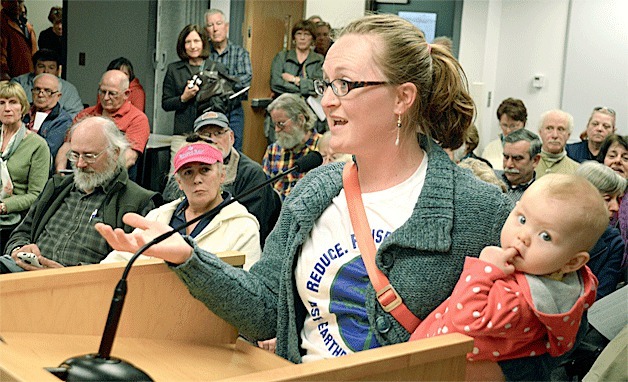The Island County commissioners delivered a bit of irony this week when they killed a curbside recycling program on Earth Day.
The board hammered the final nail into the coffin of the controversial program aimed at bringing curbside service to Langley and unincorporated areas of Whidbey Island.
The vote Monday was 2-1.
Republican commissioners Kelly Emerson and Jill Johnson voted to end the planned service while Commissioner Helen Price Johnson, a Democrat, voted to continue it.
The vote effectively rescinded an ordinance the board adopted in December.
“Shame on you,” chanted Coupeville resident Paula Spina loudly, moments after the vote to end recycling service.
Though the meeting was not yet finished, the mantra was picked up by others in the room, drowning out any possibility of further action.
Approximately 50 people attended the hearing.
After the room was cleared, heated discussion among those on opposite sides of the issue continued in the hallway.
Monday’s public hearing and the subsequent vote took place during the board’s first regularly scheduled evening meeting.
Curbside recycling was under discussion for the past five years. A previous board nearly moved forward with a program in 2007, holding several community meetings, but aspects of the plan proved unpopular.
It was mandatory for existing Island Disposal customers, and the hauler would not accept glass. Efforts to find another hauler was unsuccessful and the plan was shelved for several years while the county looked for alternatives.
In 2012, the county again sought haulers, but Island Disposal was the only company to respond. It submitted a plan nearly identical to the one presented years earlier.
At an estimated $11.60 a month, however, it was almost twice as expensive as the $6.40 rate proposed in 2007.
Once again, glass was not accepted and curbside service would be contingent on subscription to trash pickup. The plan did not force the public to become an Island Disposal customer, but anyone who pays for the hauler’s trash service would also have to pay for recycling.
In December, the Democrat-dominated board ended the long debate by passing an ordinance requiring Island Disposal, the county’s franchised hauler, to roll out the program this year.
The dust hardly settled, however, when a new Republican-led board agreed in January to begin the process of rescinding the ordinance.
Monday’s meeting saw more than two-hours of public testimony but few new arguments. Some complained about the service’s shortcomings while others proclaimed its benefits.
“This forces an urban service into a rural area,” said Ray Gabelein, a Freeland resident.
“It doesn’t make sense.”
Opponents of the curbside program said they are avid recyclers, but believe the program was too expensive, inadequate and went too far.
“I don’t want government telling me what to do at every single level,” said Pam Neschke, also of Freeland.
Others voiced equally passionate arguments in favor of the program, among them a mother with two children. Ryan Lipstein, a teacher at Oak Harbor High School, said she was “disheartened” to hear the board was considering rescinding what she called a “necessary, efficient, effective” program.
“I really urge you to hold onto this,” Lipstein said. “It’s a good thing and I think you’ll be happy with it in the future when you look back, so please don’t repeal it.”
She was joined by the Oak Harbor High School’s Ecology Club. The small group of teens urged the board not to rescind the ordinance and set an example for the next generation.
“If they see from the adults in the community that recycling isn’t a priority, it won’t be a priority to them,” said Reilly Richards, 16, the club’s secretary.
Carol Dawes said she lives on a fixed income and would happily pay the extra $11.60 to cover the cost of the curbside program.
“I’m willing to pay whatever I need to pay in order to take care of this planet and this county,” she said.
“I try to make decisions my grandkids can be proud of,” Price Johnson responded. “I think it is the right thing to do.”
Emerson, however, said she remains “not convinced” that recycling statistics provided by county Public Works officials are accurate and that the program will actually reduce the county’s carbon footprint.
Also, the exclusion of glass is too large a shortcoming to ignore, she said.
Johnson said she does accept the county’s statistics as accurate and thanked department officials for their years of work in preparing the complicated and controversial proposal.
However, Johnson said she won’t consent to a program that mandates the participation of Island Disposal customers and removes the financial risk of a private business with public tax dollars.
“I hope the students who felt they were learning a lesson in the value of recycling also learned a lesson in the value of economics,” Johnson said.
“My personal belief is we’re just not ready to move this forward.”



